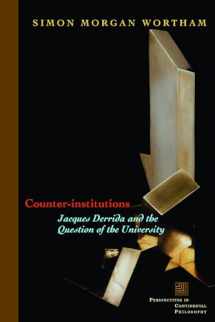
Counter-Institutions: Jacques Derrida And the Question of the University (Perspectives in Continental Philosophy)
ISBN-13:
9780823226658
ISBN-10:
0823226654
Edition:
1
Author:
Simon Morgan Wortham
Publication date:
2007
Publisher:
Fordham University Press
Format:
Hardcover
150 pages
FREE US shipping
Book details
ISBN-13:
9780823226658
ISBN-10:
0823226654
Edition:
1
Author:
Simon Morgan Wortham
Publication date:
2007
Publisher:
Fordham University Press
Format:
Hardcover
150 pages
Summary
Counter-Institutions: Jacques Derrida And the Question of the University (Perspectives in Continental Philosophy) (ISBN-13: 9780823226658 and ISBN-10: 0823226654), written by authors
Simon Morgan Wortham, was published by Fordham University Press in 2007.
With an overall rating of 3.8 stars, it's a notable title among other
Churches & Church Leadership
(Science & Religion, Religious Studies, Higher & Continuing Education, Christian Books & Bibles) books. You can easily purchase or rent Counter-Institutions: Jacques Derrida And the Question of the University (Perspectives in Continental Philosophy) (Hardcover) from BooksRun,
along with many other new and used
Churches & Church Leadership
books
and textbooks.
And, if you're looking to sell your copy, our current buyback offer is $0.3.
Description
This book provides a definitive account of Jacques Derrida's involvement in debates about the university. Derrida was a founding member of the Research Group on the Teaching of Philosophy (GREPH), an activist group that mobilized opposition to the Giscard government's proposals to "rationalize" the French educational system in 1975. He also helped to convene the Estates General of Philosophy, a vast gathering in 1979 of educators from across France. Furthermore, he was closely associated with the founding of the International College of Philosophy in Paris, and his connection with the International Parliament of Writers during the 1990s also illustrates his continuing interest in the possibility of launching an array of literary and philosophical projects while experimenting with new kinds of institutions in which they might take their specific shape and direction. Derrida argues that the place of philosophy in the university should be explored as both a historical question and a philosophical problem in its own right. He argues that philosophy simultaneously belongs and does not belong to the university. In its founding role, it must come from "outside" the institution in which, nevertheless, it comes to define itself. The author asks whether this irresolvable tension between "belonging" and "not belonging" might not also form the basis of Derrida's political thinking and activism where wider issues of contemporary significance are concerned. Key questions today concerning citizenship, rights, the nation-state and Europe, asylum, immigration, terror, and the "return" of religion all involve assumptions and ideas about "belonging"; and they entail constitutional, legal, institutional and material constraints that take shape precisely on the basis of such ideas. This project will therefore open up a key question: Can deconstruction's insight into the paradoxical institutional standing of philosophy form the basis of a meaningful political response by "theory" to a number of contemporary international issues?


We would LOVE it if you could help us and other readers by reviewing the book
Book review

Congratulations! We have received your book review.
{user}
{createdAt}
by {truncated_author}


